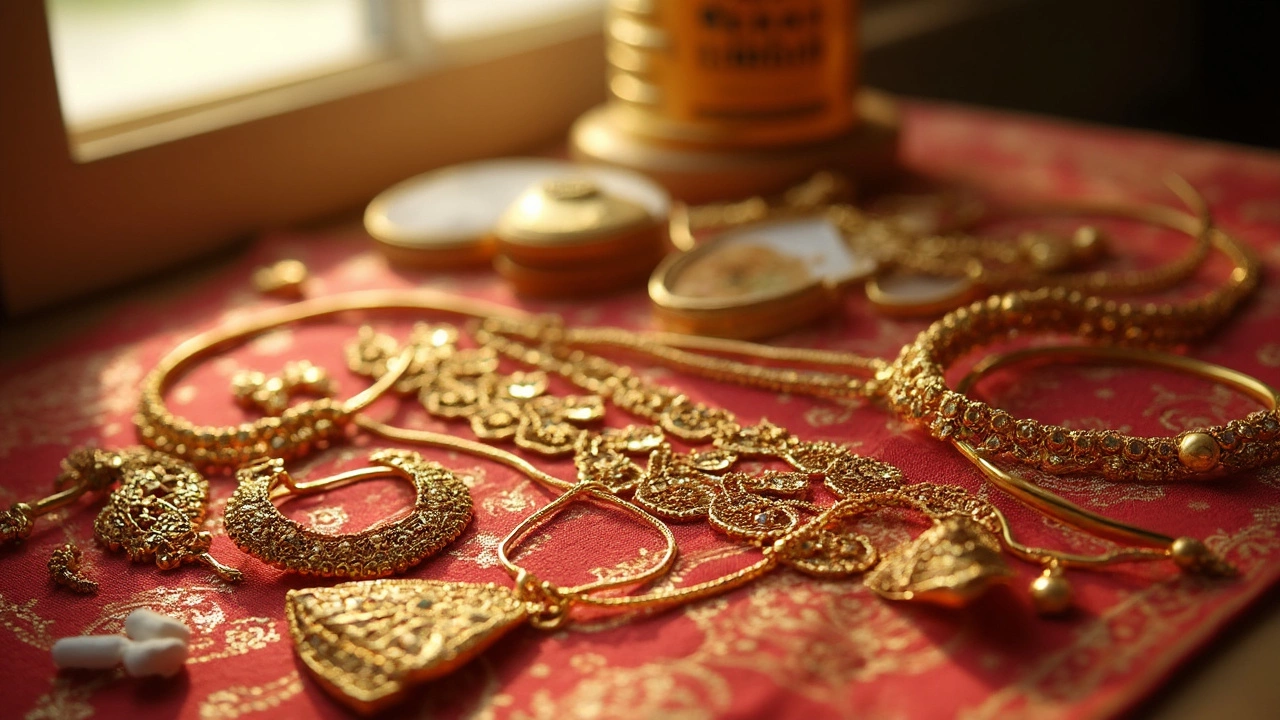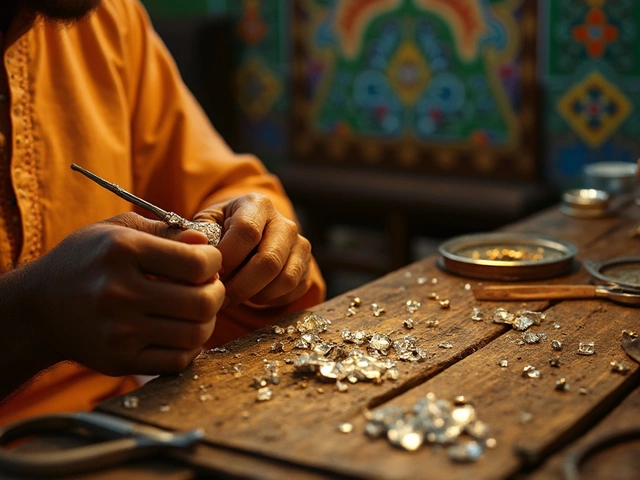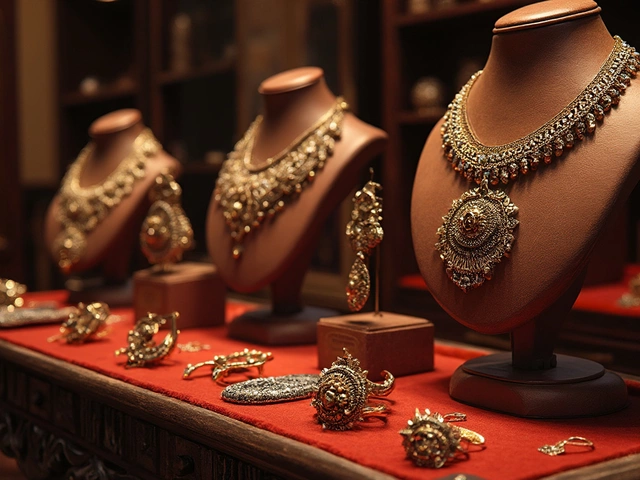
So, you've got a stunning piece of gold jewelry and you're wondering if vinegar could be the secret to keeping it sparkling clean. Let's cut to the chase—can you use vinegar to clean gold jewelry? In short, the answer is yes, but with some big caveats. Vinegar, a household staple, is known for its acidic nature which can sometimes make it a good cleaning agent for certain metals and surfaces. However, gold is a soft metal, and when using any cleaning agent, you need to tread carefully.
First off, it's crucial to know what your gold jewelry is made of. Pure gold, or 24k, is often too soft for wearable items, so it's typically mixed with other metals like copper or silver to make it more durable. This means that while vinegar might not harm the pure gold part, it could affect the alloy components, especially if your piece is gold-plated or has gems attached.
If you're thinking about using vinegar, you’ll be glad to hear it's pretty straightforward. Mix one part vinegar with two parts water, soak a cotton ball in the solution, and gently rub your jewelry. Too much scrubbing might scratch the surface, so be gentle. And remember, it's always smart to do a spot test first. But hold on, before you get started, there are some points to consider to avoid any unwanted surprises with your precious items.
- Understanding Gold Jewelry Composition
- The Vinegar Cleanup Process Explained
- Benefits and Risks of Vinegar Cleaning
- Alternative Methods for Cleaning Gold Jewelry
Understanding Gold Jewelry Composition
Before diving into cleaning methods, it's handy to grasp what your gold jewelry consists of. You might think all gold jewelry is just gold, but that's not always the case. Jewelry that's purely made of 24-karat gold would be so soft you'd basically have a wearable banana. To make it more practical for day-to-day wear, gold is mixed with other metals, creating an 'alloy'.
Common metals mixed with gold include copper, silver, and nickel. This mix doesn't just add strength; it influences the jewelry's color and overall look. For example, mixing gold with copper gives it that trendy rose gold hue. Meanwhile, white gold is produced when gold is combined with metals like palladium or nickel.
Different Gold Karats
You've probably heard terms like 18k, 14k, or 10k when shopping for jewelry. What does this all mean? It's all about the amount of pure gold in your jewelry piece. An 18k gold item means it's 75% gold. The remaining 25% is made up of other metals. This mix can affect how durable your piece is—and how it responds to cleaning methods, including the use of vinegar.
| Karats | Gold Purity | Common Alloys |
|---|---|---|
| 24k | 99.9% Pure Gold | None |
| 18k | 75% Gold | Copper, Silver |
| 14k | 58.3% Gold | Nickel, Copper |
| 10k | 41.7% Gold | Mixed Alloys |
Knowing these basics about your jewelry's composition can help you understand why some cleaning methods, like using vinegar, may work for certain pieces and not so much for others. It’s all about finding that balance between maintaining beauty and ensuring longevity.
Understanding the composition is essential when it comes to the appropriate care and cleaning of your precious items. After all, the last thing you want is to mess up a family heirloom or your latest splurge!
The Vinegar Cleanup Process Explained
Cleaning gold jewelry with vinegar isn't rocket science, but it does need a little bit of care to prevent any damage. Here's how to safely use vinegar to give your gold items a fresh, clean look.
Preparation
Before you start, gather a few materials: a small bowl, white vinegar, water, a soft cloth, and a toothbrush with soft bristles. It's crucial to use a soft cloth and brush because gold can scratch easily.
Step-By-Step Process
- Mixing the Solution: In a bowl, mix one part white vinegar with two parts water. This dilution helps to make sure the vinegar isn’t too strong, which could damage your jewelry.
- Testing First: Before you dunk your jewelry in, do a spot test. Dab a little of the solution on an inconspicuous area of the jewelry and let it sit for a minute. If nothing funky happens, you’re good to go.
- Soaking: Gently place your jewelry in the bowl. Let it soak for a few minutes. You don’t need to leave it in there too long—just enough to loosen any dirt or grime.
- Brushing Gently: Take the toothbrush and lightly brush over the jewelry to remove any stubborn dirt. Remember, be gentle! Gold's soft and doesn’t need too much elbow grease.
- Rinsing: Once you've brushed off the grime, rinse the jewelry under lukewarm water. This ensures all the vinegar is flushed away.
- Drying: Finally, pat the jewelry dry with the soft cloth. Make sure no moisture is left, especially in crevices or around stones, as water can lead to tarnishing.
By using this method, your gold jewelry should end up looking refreshed without the risks of harsher cleaning chemicals. Vinegar is great because it’s natural and, most people have some sitting around at home!
But remember—avoid using vinegar if your jewelry is studded with pearls or other softer gemstones, as the acid can damage them. If you're unsure about the type of jewelry or stones, it's always best to consult a professional jeweler first.

Benefits and Risks of Vinegar Cleaning
Using vinegar to clean gold jewelry does come with a mixed bag of perks and pitfalls. Let's explore what you should know before you go dipping your prized possessions into a vinegar bath.
Benefits of Using Vinegar
The biggest perk is that vinegar is easy to get your hands on. It's right there in your kitchen. Plus, it's pretty affordable compared to some specialty cleaning solutions marketed specifically for jewelries. If used cautiously, vinegar can shine up your gold pieces by breaking down the grime without you breaking a sweat.
It’s also a natural option, which means you're sidestepping some of the harsh chemicals that can sometimes come with specialized products. If you're eco-conscious, that's a win.
Risks Involved
Now, onto the risks. First off, not all gold jewelry is created equal. As mentioned earlier, gold alloys, which mix gold with other metals like silver or copper, might not react the same way to vinegar. If your jewelry contains multiple metals, one could tarnish while the gold remains safe.
For jewelry with gemstones, be extra cautious. Vinegar might not damage the gold, but it can dull some stones or loosen their settings. Nobody wants their sapphire taking an unexpected swim down the sink drain.
Also, remember that too much exposure can strip even the finest gold pieces of their shine over time. If you’re thinking about doing this regularly, it’s better to use it sparingly so you don’t end up wearing your gold down.
By the Numbers
| Factors | Gold Care Concerns |
|---|---|
| Acid Levels | Mild, but can affect softer metals |
| Cost | Very low, less than £1 per clean |
| Ease of Use | Simple, requires careful handling |
All in all, using vinegar can be an efficient and cost-effective method, if you handle it with care. Always do a spot check, especially if your piece is an heirloom or particularly delicate. When in doubt, consulting a professional might save you some heartache—and money—in the long run.
Alternative Methods for Cleaning Gold Jewelry
Alright, so maybe vinegar doesn’t seem like the best fit for cleaning your cherished gold pieces. No worries, there are other tried-and-true methods you might consider!
Soap and Water
Sometimes the simplest solution is the best. A mild dish soap mixed with warm water can work wonders. Just be sure it's something gentle, without harsh chemicals. Here's how you can do it:
- Mix a few drops of dish soap in a bowl of warm water.
- Let your gold jewelry soak for 15-20 minutes.
- Use a soft-bristled toothbrush to gently scrub any crevices.
- Rinse under warm water and dry with a soft cloth.
Baking Soda and Water
This method is particularly useful if your gold jewelry is looking a bit dull. Baking soda is a mild abrasive, so be gentle:
- Create a paste with baking soda and water.
- Apply it to the jewelry with a cloth and gently rub in circular motions.
- Rinse thoroughly and dry completely to avoid moisture damage.
Professional Cleaning Solutions
If you want that professional touch at home, consider purchasing a gold jewelry cleaning solution. These are usually available at jewelry stores and are specially formulated for safe use on gold.
Whichever method you choose, being gentle and not overdoing it is the key. And if in doubt, remember your jeweler is just a visit away for expert advice!




